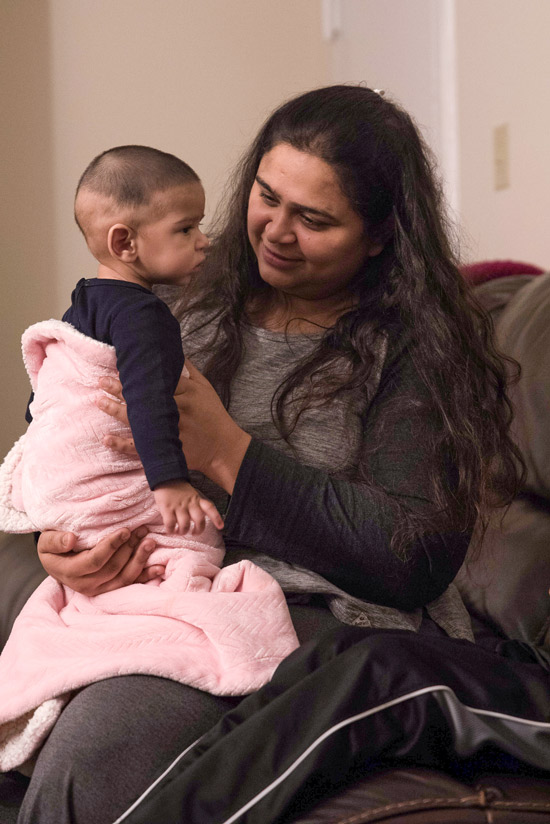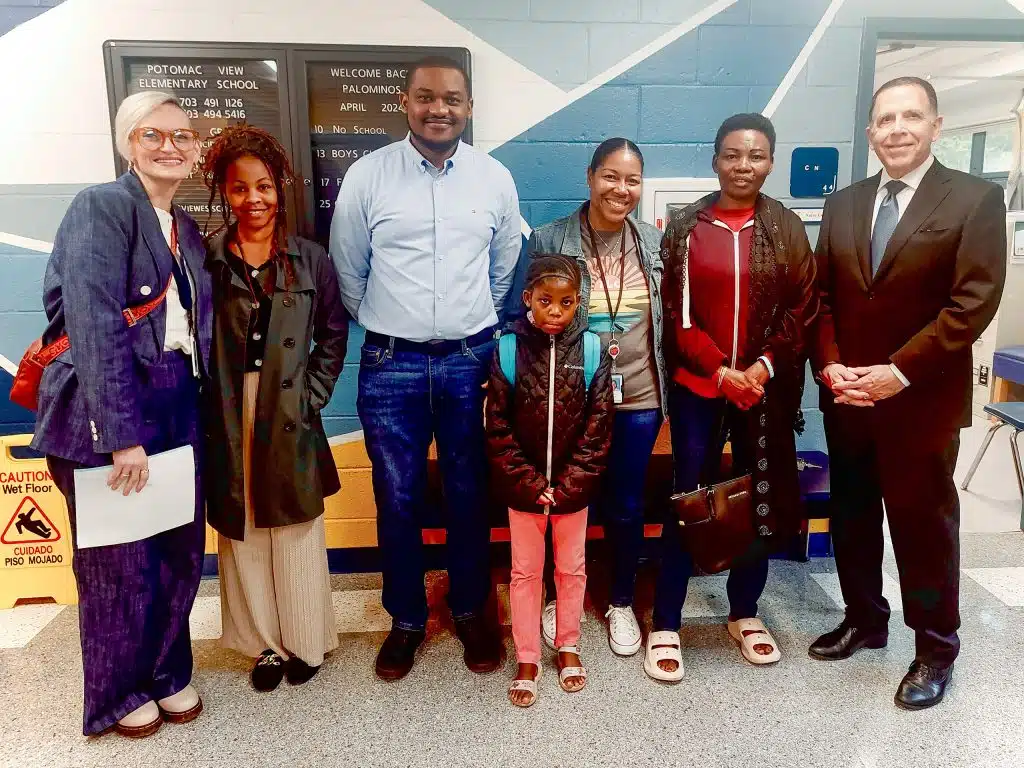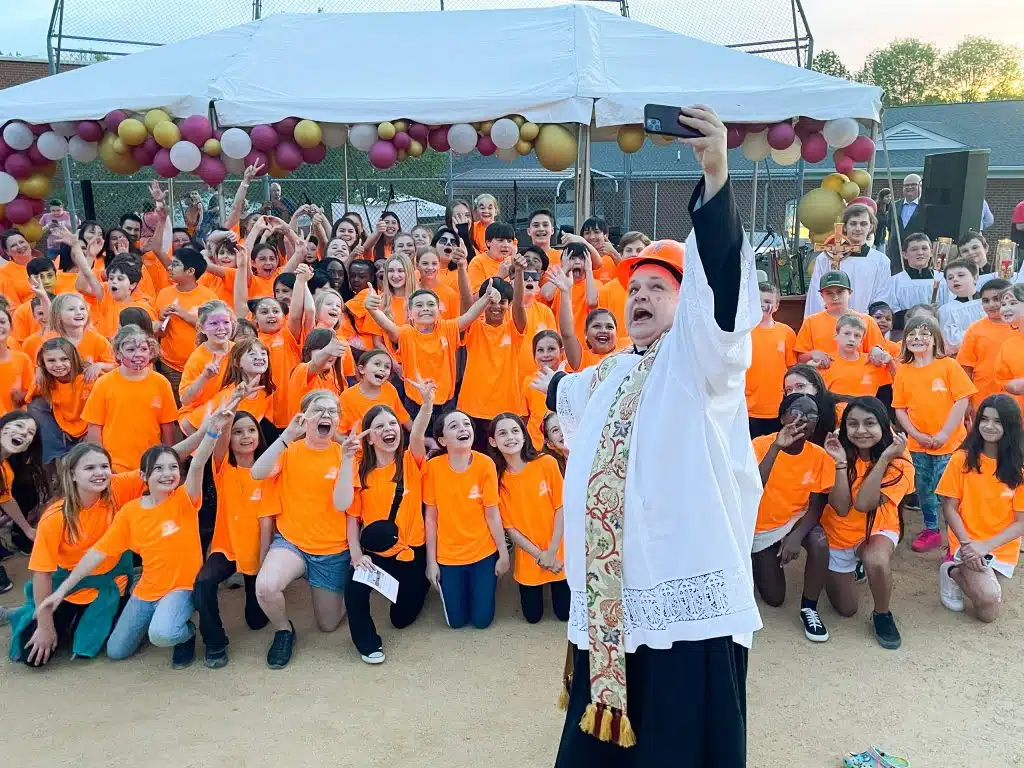After months of harassment from Muslim extremists, Catholics Aman and Arooj Kotak fled the life they had built for themselves in Karachi, Pakistan, in the hopes of finding peace and safety in the United States. They expected the transition to be difficult. But they didn’t expect Arooj would become pregnant while they were applying for asylum, while Aman was not authorized to work, while they were living with friends of friends in a Fairfax apartment and while they had no health insurance.
On top of everything else, Arooj previously had two miscarriages because of a protein deficiency, and they knew she would need expensive treatment throughout the pregnancy. But they were determined to find a way. “I told Arooj one day that if it comes to that, we’ll spend even the last penny we have left to cover for the medication,” said Aman. Fortunately, with the help of fellow Fairfax Catholics, the family found another way.
The persecution
The first time Aman came to the United States, it wasn’t to save his life but to get an education. Aman said employers in Pakistan favor candidates who have graduated from foreign universities so in 1998, he came to Washington to earn a degree in financial management from the now closed Southeastern University. Both he and Arooj had grown up speaking Urdu and English, the official languages of Pakistan.
After graduating, Aman returned to Pakistan and began working in banking. Arooj worked as a project executive at an internet company before the couple married in 2009. The following year, Arooj gave birth to their son, Aryan.
The Kotaks’ trouble began in September 2014, when Aman, as head of the bank’s customer satisfaction and quality division, gave a routine training session on service excellence. “I was making an analogy. (When) we pick up things from our colleagues and don’t refer to the standard procedures of the bank, we end up making big mistakes in the process, (just as) people go to mosque and don’t go through the Quran and end up listening to the preacher who has his own understanding of the book,” he said.
After the session, five or six of people chastised him for speaking about Islam when he wasn’t Muslim. He was surprised his remark had offended them and quickly apologized. But the next day he learned they had reported to human resources that he was using his authority to spread anti-Islam propaganda. “It spread like wildfire,” said Aman, even to people who had nothing to do with the bank.
Life as a member of a religious minority in Pakistan has become more difficult in the past 10 years, said Aman. “Due to the exposure of electronic media, society has become very extreme and very rigid. You don’t have that much religious tolerance,” he said. Oftentimes, the mistreatment can be subtle. “For instance, many of the building maintenance people were very staunch Muslims, and they never used to listen to us when we would complain about certain things,” he said. But consequences also could be severe. Pakistan has laws against blasphemy, and the penalty is capital punishment.
After Aman made the offhand remark, he began receiving threatening, untraceable phone calls at work, then at home. Arooj started to notice people following her when she went out. So, the couple started sending Aryan to remedial classes at night with Arooj taking him to and from school. Days before Arooj gave birth to their second child, Angel, they moved from their predominantly Muslim apartment complex to one that had Christians and Muslims.
But the harassment continued. The fundamentalists wanted Aman to put a notice in the paper and to renounce his faith. “They said I had to come out with a public apology, but I knew that was writing my own death sentence,” he said.
The flight
Eventually, Aman told his line manager and went to the police to file a report. “But the moment I mentioned the remark, the police officers backed away. When they heard it was something to do with Islam and blasphemy, that’s considered a very serious issue, (and) even they don’t want to (do anything),” he said. He was told to come in the next day with a chronological list of all the incidents of harassment.
“The same night, I received a call from those individuals. They said, ‘Look, we have eyes and ears everywhere and we know you went to the police. You were wearing this shirt. Your son studies at this school. And if you even think about going to the police, you’ll never see your son again.’ ”
For many more months, they held on. Power breakers were stolen, key holes were filled with superglue, and graffiti appeared spouting messages such as, “This is the house of infidels.” Neighbors and even childhood friends began to shun them. They stayed many nights and weekends with family members. They stopped going to church.
Arooj was diagnosed with anxiety. Aman began to look for a job in another city or in the more liberal United Arab Emirates. “I was applying everywhere. We were so desperate to make a move,” he said. In the meantime, they applied for a visa to visit the U.S.
The final straw came one July evening when Arooj, Angel, Aryan and their maid were walking along the road to the market. As Arooj was about to cross the road, a black SUV sped toward them. She pushed the kids and the maid out of harm’s way, but the car ran over her foot. Two months later, September 2017, the family of four flew to America. “We left everything behind. We just packed our clothes,” said Aman. “It was just a life and death thing,” said Arooj.
Taking baby steps
Coming to the states was more than a culture shock — it was a reality shock, said Aman. They went from being relatively prosperous in Karachi to living with strangers. They had no family or friends. And in January 2018, they realized Arooj was having a baby.
Arooj Kotak holds her daughter Aryana. ZOEY MARAIST | CATHOLIC HERALD
The Kotaks’ lawyer, who is Catholic, suggested the couple go to Tepeyac OB/GYN in Fairfax. During their first visit, they were told the practice normally would pay for their medical care, but that Arooj’s daily injections of heparin would be too expensive. As they sought service at other clinics, Tepeyac called back saying they had found a donor to cover the cost.
The support continued throughout the pregnancy. A few days before Arooj gave birth, Miriam Joy, a volunteer of Gabriel Project at St. Leo the Great Church in Fairfax, took Arooj shopping. They got baby clothes, a car seat, a bassinet and other essentials. Joy and others from St. Leo visited the family and baby Aryana in the hospital. Afterward, Eucharistic ministers brought them Communion. At Christmas, Gabriel Project volunteers brought the family presents.
“(These people) reached out to us just like they were family to us. People were so generous and full of kindness,” said Aman. “That difficult time brought us closer to Jesus and God. We had our faith becoming more strengthened every day.”
“It was really a big thing for us because we don’t know anyone here,” said Arooj. “If Aryana is here, it’s just because of all of them. The joy we have right now is just because of them.”
Shortly before Aryana was born, Aman found part-time work at Target. With help from diocesan Catholic Charities job ministry, he also began work at PNC Bank. But money is still tight, said Aman, and in a few weeks, they’ll have to move to their own apartment.
Joy said she is inspired by the tenacity and faithful witness of the Kotaks. “They just keep putting one foot in front of the other,” she said. “Knowing them, the whole story of the Holy Family came to life for me —fleeing with nothing and praying that someone would receive them when they got to the other side.”



